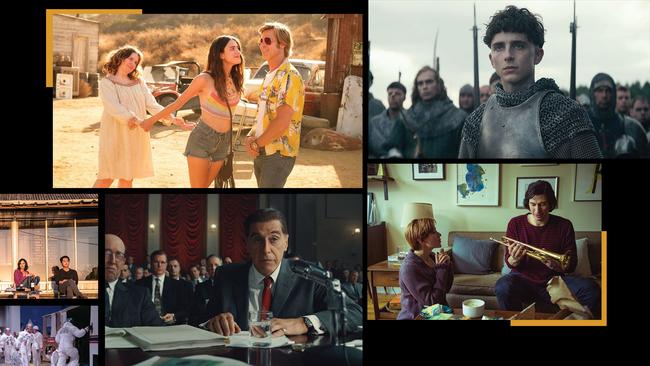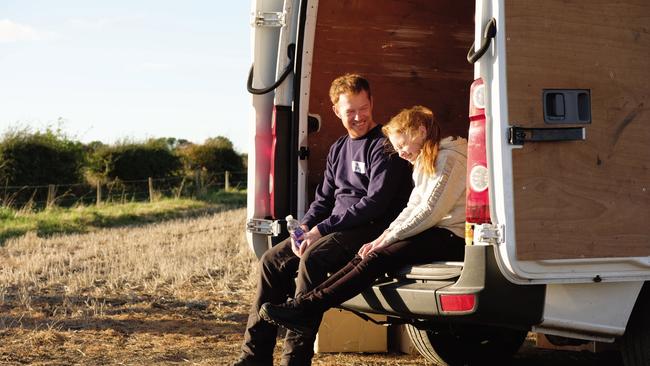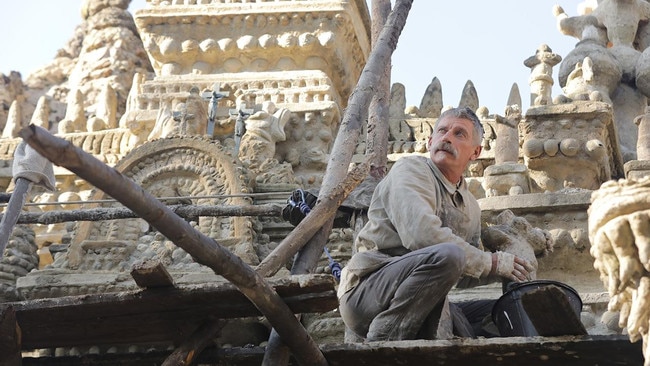The List: David Stratton’s top movies of 2019
If the plot of Sorry We Missed You seems like dry material, I can only say it is one of the best, most moving, films I’ve seen all year.

British director Ken Loach, now in his early 80s, has been directing dramatic stories for television and the cinema since 1966, when his BBC film, Cathy Come Home, cast a spotlight on homelessness among young people in Britain. Loach has never been a flashy filmmaker; he has remained true to his principles and has invariably explored social issues in a realist style. Working in recent years with screenwriter Paul Laverty, Loach has been producing some of his finest work: I, Daniel Blake (2016), the heartbreaking story of a decent man trying to cope with the welfare system, deservedly won the Palme d’Or at Cannes. And now comes Sorry We Missed You, an equally fine film about a working-class battler trying to survive in the “gig” economy.
When we first meet Ricky Turner (Kris Hitchen) he’s being interviewed by Maloney (Ross Brewster), who runs a franchise delivery service called PDF (Parcels Delivered Fast) that employs contractors. Ricky has been doing casual work wherever he can find it. He’s been employed as a builder, a carpenter, even a gardener. He’ll put his hand to anything to earn a quid. Maloney explains that, as a franchise owner, Ricky will be his own boss, not an employee. So he won’t be paid wages, but stands to earn a great deal more than an employee would normally earn in the delivery business. There’s one major catch: he will have to own his own van, or pay a very steep rental for one of Maloney’s vans.

Ricky’s lovely wife, Abby (Debbie Honeywood), is a carer who makes home visits to her mostly elderly patients. But if Ricky is to raise enough money to buy his own van, Abby will have to sell her car and use public transport. Reluctantly she agrees, persuaded that, in the end, the financial rewards will make the sacrifice worth it.
The first day he turns up at the PDF headquarters driving his newly acquired van, Ricky is overwhelmed with the company’s rules and regulations. Some parcels have to be delivered at a specific time. He’s supplied with a scanner that not only tracks the parcels but will also track Ricky. Maloney proves to be a ruthless boss who will not countenance any delays or any mistakes. And what sounded great in the interview proves to be less so in the real world, a world of traffic jams, difficult customers and other unforeseen complications. Ricky finds himself working a 12-hour day.
Meanwhile it is, of course, taking Abby far more time to visit all her needy patients, and that means the couple are spending far less time at home with their two children. The younger one, 11-year-old Liza Jane (Katie Proctor), is a sensible child but she’s not happy when the reality that her parents will have less time for her sinks in. Her older brother, 15-year-old Sebastian (Rhys Stone), is going through a difficult phase; he’s skipping school to hang out with his mates on the streets, and even gets caught shoplifting. These family problems, which have to be dealt with as a matter of urgency, further impact on Ricky’s difficult work schedule.
The story that Loach and Laverty are telling here is, clearly, just one example of the problems facing the working poor and not only in Newcastle-upon-Tyne, where the film is set. The pitfalls of the gig economy, of franchising, are equally obvious here in Australia, and the film vividly depicts the pressures on family life of these unrealistic and, in the end, underpaid work practices. If this sounds like dry material for a summer holiday movie release, I can only say that Sorry We Missed You is one of the best, and most moving, films I’ve seen this year. Every member of the cast of little-known actors gives heartbreakingly true performances under Loach’s sympathetic direction and the unobtrusive cinematography and directorial style prove to be a perfect fit for the material. Some may find this a “small” story, but its implications are vast and for this reason it’s a hugely important movie.
Sorry We Missed You (MA15+)
Limited national release from Boxing Day
Insight into man in McCarthy’s ear
Roy Cohn is probably best remembered for his role as chief counsel to Senator Joe McCarthy during the Congressional Hearings into Communism in the mid-1950s — he was the man seen in photographs whispering into McCarthy’s ear. Matt Tyrnauer’s enlightening documentary Where’s My Roy Cohn? tells us a lot more about the man: that when still in his 20s he had prosecuted the Rosenbergs, the atomic spies who were convicted and executed, and that, later on, he was the lawyer for some of New York’s leading Mafia families. Later still he became a mentor and legal advisor to a youthful Donald Trump. It was quite a career, and the talking heads who tell his story are nothing if not forthright: “You knew you were in the presence of evil,” says one about the “beyond Machiavellian” lawyer.
Where’s My Roy Cohn? (PG)
Limited national release
The postman’s palace
The incredible story of Postman Cheval, to quote the French title of this modest but attractive film, really is quite a remarkable one. Born in the Drome department in southeastern France, Ferdinand Cheval left school at 13 and eventually became the district postman. He was in his early 40s when he started building the structure he called “le Palais ideal” (the ideal Palace), the inspiration for which came from photographs he saw of Angkor Wat and of Mayan temples.

The structure still stands today and is a tourist attraction near the town of Hauterives.
Director Nils Tavernier has cast Jacques Gamblin as Cheval, and the actor — who looks a bit like the real character — gives a fine performance as the painfully shy, inarticulate and reticent man; he also ages convincingly as the years pass.
The film depicts Cheval as being almost an outsider in his own community because he seemed to be so strange. He started building his palace — construction of which took 33 years — as a gift to his beloved second wife, Philomene (Laetitia Casta) whom he married after the death of his first wife.
Though the story is fascinating enough, The Ideal Palace lacks the dramatic depths that might have made it a compelling screen experience. It’s interesting and attractively photographed, but not in any way outstanding.
The Ideal Palace (L’incroyable histoire du Facteur Cheval) (PG)
Limited release
Sea of imagination
Perhaps the most exquisitely beautiful of recent anime films from Japan, Children of the Sea is based on a manga about a young girl, Ruka, whose father works in an aquarium and who is obsessed with sea creatures of all shapes and sizes. One day she encounters two strange brothers, Umi (which means “sea”), who is short and dark, and Sora (“sky”), who is tall and fair. They have, they claim, been raised by dugongs and they have a mystical connection with the ocean and its denizens. Soon Ruka is joining them in their underwater adventures.
The technical brilliance of the film far outweighs the drawbacks, which include a rather clunky plot and some thinly drawn characters.
Children of the Sea (Kaiju no kodomo) (PG)
Limited national release




To join the conversation, please log in. Don't have an account? Register
Join the conversation, you are commenting as Logout